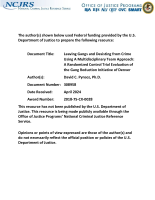Evidence processing
Assessment of analytical workflows of gunshot residue evidence and strategies for implementation of advanced technology in crime laboratories
Analytical approaches to differential extraction for sexual assault evidence
Untangling the Influences of Unmodeled Evolutionary Processes on Phylogenetic Signal in a Forensically Important HIV-1 Transmission Cluster
Criticality of Spray Solvent Choice on the Performance of Next Generation, Spray-Based Ambient Mass Spectrometric Ionization Sources: A Case Study Based on Synthetic Cannabinoid Forensic Evidence
Reducing Collateral Consequences with Records Relief: Organizational Readiness for Implementing Strategies in State Courts
Unwinding the Impact of Body Worn Camera Evidence on Prosecutor Workload
Closing Cases Using Gunshot Residue
Not every crime scene will have definitive evidence, such as DNA, to link an individual to a crime. In those cases, law enforcement relies on other evidence to build the burden of proof. NIJ graduate research fellow Dr. Shelby Khandasammy developed a tool to analyze organic gunshot residue and distinguish between different firearms calibers and manufacturers. She joins Marie Garcia, office director for the Office of Criminal Justice Systems at NIJ, to talk about her work and experience as a research fellow.
Leaving Gangs and Desisting from Crime Using a Multidisciplinary Team Approach: A Randomized Control Trial Evaluation of the Gang Reduction Initiative of Denver
Application of a Modified 3D-PCSI-MS Ion Source to On-Site, Trace Evidence Processing via Integrated Vacuum Collection
An Image Analysis Framework for Objective Color Interpretation of Seized Drug Tests
Collecting and Analyzing DNA Evidence from Fingernails: A Comparative Study
Two-year review of firearm-related DNA casework evidence: A triage process to improve quality and efficiency
Cuyahoga County, Ohio, Heroin and Crime Initiative: Informing the Investigation and Prosecution of Heroin-Related Overdose, Research Abstract
Development and validation of a novel method "SpermX (TM)" for high throughput differential extraction processing of sexual assault kits (SAKs) for DNA analysis
Complex Drug Mixtures Analysis, Using Open-Source Search Software and Library Building Tool
Fingerprint Sourcebook - Chapter 11: Equipment
Bio-Inspired Magnetic Beads for Isolation of Sperm from Heterogenous Samples in Forensic Applications
No Suspect Casework DNA Backlog Reduction Program FY 2001 (Connecticut)
Monitoring the Clandestine Synthesis of Methamphetamine in Real-time with Ambient Sampling Portable Mass Spectrometry
Integrated Sample Cleanup-Capillary Electrophoresis Microchip for High-Performance Short Tandem Repeat Genetic Analysis
Comparative Evaluation of Genotyping Technologies for Investigative Genetic Genealogy in Sexual Assault Casework
Identification, Corroboration, and Charging: Examining the Use of DNA Evidence by Prosecutors in Sexual Assault Cases
A Unique Approach to a Crime Gun Intelligence Center with the Inclusion and Support of 3D Virtual Comparison Technologies





